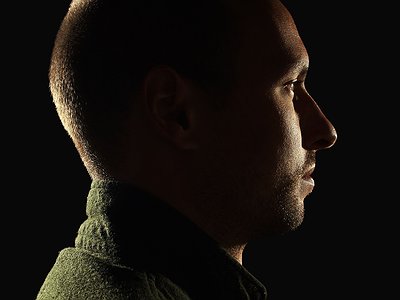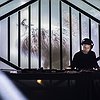What was your first studio like? How and for what reasons has your set-up evolved over the years and what are currently some of the most important pieces of gear for you?
The first thing I had was a TC Electronic Fireworx effects processor. It's a so called modular digital processor, i.e. its internal effects can be combined with each other in any way you like and, more importantly, each of their parameters can be controlled by a vast range of modulation sources including envelope and pitch followers. Essentially the effects can be modulated by properties of the actual input signal. The latter capability has been at the core of my engineering ever since. I already knew my way around this piece of gear before I did any tracks. I then had an Akai sampler and a bit later I got a Waldorf Microwave II synthesizer, too. Thus working with samples and wavetable synthesis and linking these up to complex effects chains are pretty much what I do in terms of engineering, until today.
I've had a few eye-opening moments since then, like when I first got a great reverb. That caused a total shift in sound – it allowed me to have less clutter that I used to fill up space with. My EP for Perlon was the first release with that addition to the setup. I've expanded the collection quite a bit over the years and I've worked much more with synthesis than in my early years. I guess the typical reasons for shopping apply: you get a tax write off and it looks pretty damn good. Also, music industry has deflated quite a bit in terms of the amount of money that is sloshing around – or just more people are trying to grab some of it, so there's potentially less in it for you as an individual. Those at the spending end have been quite motivated to drive all prices to zero. In this scenario it helps having a studio that conveys “this is not going to be cheap” when negotiating projects. It allows you to talk less.
Yet when we're just talking about the music, the added utility of owning fifty pieces of premium gear or a better mixer or a superb compressor isn't all that great. There is no imminent need. Many people would just rather go shopping than developing something on their own.
How do you make use of technology? In terms of the feedback mechanism between technology and creativity, what do humans excel at, what do machines excel at?
Why make this distinction? At the risk of sounding didactic: Technology is made by people. Thus it is a collection of artifacts of creativity – physical shells containing human effort that can be reapplied. It's not very different from ideas which circulate, such as a “chord” or a “beat”: concepts – another sort of shell that makes it possible for human effort to travel. So technology is just ideas, packaged differently. We're probably a million years removed from the point at which you could still draw any meaningful line between man and machine. If you ever could, that is. There is this joke that technology is what came after you were born. Like, a mobile phone is technology while a spoon or the alphabet or a refrigerator aren't. We are looking at a line that (quite artificially) starts with a stick or a stone and currently gives us a VST synthesizer that recombines four types of synthesis into one hybrid model and runs on a MacBook. Yet any layer of technology 'bootstrapped' itself from the inventory of the previous layer – it just emerges from itself through recombination. After all, there is no extraterrestrial input involved. Thus, in some way the stick must have contained VST. It's just not how we are used to view things.
Technology is one of the avenues that a social exchange of ideas can take – one could argue it's the only one left since we mostly do not communicate without some layer of technology in between. But even if, for the sake of argument, we were to ignore what we think of as technology in a narrow sense, the situation is the same. Anything related to music builds on ideas of those who came before us. The individual's contribution is some tiny shift of attention and recombination really. We're a helping hand for the machines, assisting them in recombining themselves into new configurations, just as they help us to reduce our old chores and present us with new ones instead (“Your followers haven't heard from you in a while” – like, since 10:12 AM).
Production tools, from instruments to complex software environments, contribute to the compositional process. How does this manifest itself in your work? Can you describe the co-authorship between yourself and your tools?
In my experience the simpler the relationship is kept the more complex or interesting or even relevant the results become. When I say 'complex' I do not refer to what analysis makes of composition. In the extreme, complex programming just approximates noise, so I learned quite early that complexity does not correlate with relevance or quality, however you want to define these. The greatest breakthroughs are found where the simplest thing a tool can do is uncovered. This is less trivial than it appears. Any new tool will need to either do something new or do something better, otherwise it will vanish. In music 'new' would mean to help a new unit of perception to emerge.
Here's an example: When FM synthesis was discovered it appeared to be good at creating synthetic tones that had much livelier spectral and dynamic properties than the ones possible with the previously dominant subtractive synthesis. Yet of course FM still yielded quite poor sounds according to these criteria when compared to acoustic instruments. Only when Jeff Mills and Robert Hood began programming FM in looped short sequences did FM show a potential that was impossible to realize by physical means, i.e. acoustic instruments. For lack of better terminology: the power of synthesis in a loop emerged. The combination of exact repetition and frequency modulation yielded new units of perception that can't be reduced analytically. It's really a prime example of emergent order, where “the whole is more than the sum of it's parts.” Such entities are often just implicit in music or the arts for a long time until something happens that brings it into focus. Subsequently they are formalized.
Now, of course this as well as a few other things have been discovered before I even considered doing any music. Yet it is astonishing how much order is implicit in techno and its circle of technology that isn't currently in focus, hasn't been isolated or defined. That's something I find quite rewarding – to zoom in on such instances. As an example, I found you could make very specific things with vinyl and its capacity to hold loops. So I did two records with that focus – 'The Grand Hemiola' and 'Ghost Hemiola'. The format enabled things that couldn't be achieved with different means. This is nowhere close to the significance of repetitive FM of course, but it showed me that it is possible to still uncover things that are very basic, even at this stage of development of the field.
I've entertained myself with a lot of formalism also, which is a more indirect way of working with the tools. I have found it worthwhile checking on the ingredients that get amalgamated into a loop. What happens if you change the tuning, or the meter? It turns out it's quite a lot.
Collaborations can take on many forms. What role do they play in your approach and what are your preferred ways of engaging with other creatives through, for example, file sharing, jamming or just talking about ideas?
Unfortunately I'm a terrible collaborator when it comes to sitting in the studio with another producer. The workflows just never match unless your focus has been on the most popular tools. I don't know a lot of people who work with the Microwave or the Fireworx regularly, and I tend to find producers the most interesting when they have mastered some rather obscure piece of gear as opposed to the best selling stuff. I prefer to admire them from a distance.
Maybe to keep things interesting or to go along with some demand for collaboration, I found myself working with people from different if not to say almost incompatible fields. Working with film or dance is more straight forward, but for instance conveying what electronic music is about to notation-trained musicians is quite a challenge. Overcoming the barriers of forms of music that are incompatible not only at first sight is quite intriguing.
Could you take us through a day in your life, from a possible morning routine through to your work? Do you have a fixed schedule? How do music and other aspects of your life feed back into each other – do you separate them or instead try to make them blend seamlessly?
I probably have a quite short attention span, so I can't bring myself to sit in the studio for eight hours or so at a time. Usually two a day is enough, or in two sittings in the morning and afternoon, which brings us to four. What I found is that as long as I alternate the things I'm doing I never get tired. That's probably how I ended up producing, running a label, writing, and doing a few more things. I spend an incredible amount of time on reading. This probably is the only thing I could do non-stop. Put in sequence, I probably start the day reading, then sift through my email inbox, and then go to the studio. An extended lunch break allows for more reading. There's this cafe I'm going to in the afternoons. I noticed the same three or four people are in there every time I go. I was always wondering: what do these people do for a living? Eventually it occurred to me that they probably have the same impression of me. So I'm reading there, and I guess it's not exactly leisure time because I get ideas from books which tend to yield stuff later on.
Once the caffeine has shown some effect I can go back to the studio or do some administration. Evenings and nights are my time for social interaction of any kind. So that's my day.





